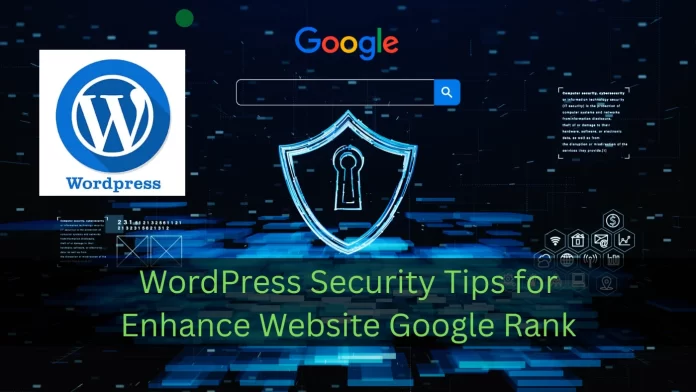Top WordPress Security Tips for Enhance Website Google Rank
Most website owners treat search engine optimization (SEO) and website WordPress Security as two completely separate tasks. SEO is for marketing, and security is for IT. This mindset is not just outdated; it’s actively costing you rankings. Google’s primary goal is to provide its users with the best, most authoritative, and safest possible results. If your WordPress site is slow, unsecured, or compromised, Google will not hesitate to bury it in the search results or remove it entirely. A secure, well-maintained website is the foundation of any successful SEO strategy, sending powerful signals of trust, reliability, and quality directly to Google.
Part 1: How Security Directly Impacts Your SEO
The connection between WordPress security and SEO isn’t just theoretical. Google uses specific, measurable signals that are directly tied to your site’s security posture.
The “Not Secure” Warning and the HTTPS Ranking Signal
This is the most direct link. An SSL certificate (which enables HTTPS) encrypts the connection between your site and your visitor.
- Direct Ranking Boost: Years ago, Google confirmed that HTTPS is a lightweight ranking signal. Given two equal sites, the one with HTTPS will get a slight edge.
- The User Experience (UX) Penalty: More importantly, modern browsers like Google Chrome will prominently display a “Not Secure” warning to visitors on any site still using HTTP. This warning shatters user trust, causing your bounce rate to skyrocket. A high bounce rate tells Google your page is not a good result, which can tank your rankings.
Core Web Vitals (Site Speed)
Your Core Web Vitals (CWV) are a critical, confirmed ranking factor. A slow site equals a poor user experience, which Google penalizes. But how does this relate to security?
- Plugin Bloat: Insecure, poorly coded, or outdated plugins are often major sources of code bloat, slowing down your site.
- Malicious Bot Traffic: A poorly secured site (especially one without a Web Application Firewall, or WAF) gets hammered by malicious bots 24/7. These bots attempt brute-force logins, scan for vulnerabilities, and scrape content. This “junk traffic” consumes massive amounts of your server’s resources (CPU and memory), slowing your site to a crawl for legitimate users and for the Googlebot. A good WAF blocks this traffic, freeing up resources and directly improving your load times and CWV scores.
Google Blacklisting: The SEO Death Sentence
This is the most devastating penalty. If Google’s crawlers detect malware, spam, or deceptive content (like a phishing page) on your site, it will take immediate action.
- Your site will be removed from search results.
- All visitors, including those from ads, will be met with a bright red “Deceptive site ahead” or “This site may be hacked” warning.
Your traffic will drop to zero overnight. Recovering from this is a slow, painful process that requires cleaning the site and submitting a reconsideration request to Google. All the SEO effort you’ve invested can be wiped out in an instant.
It’s clear that Google’s algorithm has evolved to fundamentally link security with quality. A “high-quality” site, in Google’s eyes, is one that is fast, accessible, and trustworthy. Your security measures are no longer just a defensive chore; they are a direct and vital investment in your website’s visibility and authority. Every security step you take is also a step toward protecting and improving your Google rank. Now, let’s turn these concepts into an actionable checklist that serves both your security and your SEO goals.
Part 2: The Security Checklist to Boost Your Google Rank
Use these steps to lock down your site, improve your user experience, and send all the right trust signals to Google.
- Install an SSL Certificate (Go HTTPS)
- SEO Impact: This is non-negotiable. It provides a direct (though small) ranking boost and, more importantly, removes the “Not Secure” warning. This builds user trust, lowers your bounce rate, and is a core component of Google’s E-E-A-T (Experience, Expertise, Authoritativeness, and Trustworthiness) framework.
- Use a Quality Security Plugin with a WAF
- SEO Impact: A Web Application Firewall (like those in Sucuri, Wordfence, or Solid Security) is your single best defense. It blocks malicious bots, which reduces server load and improves your Core Web Vitals. It also stops attacks before they can inject the malware that gets you blacklisted by Google.
- Keep Everything Updated (Core, Plugins, Themes)
- SEO Impact: Most hacks exploit known vulnerabilities in outdated software. These hacks are what lead to malware injection and spam links (like the “Japanese keyword hack”) that destroy your site’s relevance and get you penalized. An updated site is a clean site, and a clean site is one Google trusts.
- Harden Logins & Block Brute-Force Attacks
- SEO Impact: Brute-force attacks are a massive drain on server resources, directly harming your site’s speed (CWV). By implementing two-factor authentication (2FA) and limiting login attempts, you shut down this resource-hogging traffic and protect the “front door” to your content.
- Remove Unused Plugins and Themes
- SEO Impact: This is a simple win for both speed and security. Every plugin is a potential “attack surface” (a way for hackers to get in) and adds code that can slow your site. By deleting “dead” code, you make your site lighter and faster (boosting CWV) and more secure (reducing vulnerability).
- Perform Regular Malware Scans
- SEO Impact: A good security plugin will scan your site for malicious code. This is your early warning system. Finding and removing malware before Google finds it is the key to avoiding a Google blacklist and the ranking catastrophe that comes with it.
Stop viewing WordPress security as a separate, optional expense. It is one of the most important investments you can make in your website’s long-term SEO success. Every security measure you implement, from an SSL certificate to a firewall, directly supports Google’s mission to provide safe, fast, and trustworthy results. By hardening your website, you are not just protecting your data; you are protecting your hard-earned rankings, your crawl budget, and your brand’s reputation with both users and search engines.





